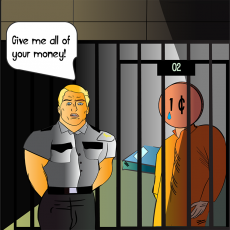
When incarcerating citizens becomes a profit motive in a business model, human suffering is the unfortunate byproduct.
In an attempt to bring this business model to an end, on Sept. 11, California lawmakers banned private prisons from operating in the state through legislative bill AB-32, pending Gov. Gavin Newsom’s signature. The passing of this legislation is being touted as a huge victory in criminal justice reform because it aims to phase out all private prisons in California by 2028.
The U.S. holds the honor of being one of the most incarcerated countries in the world, and it is this large prison population that spurred the growth of the private prison industry since its boom in the 1980s.
According to the federal Bureau of Justice Statistics, private prisons housed 7,000 California prisoners, or 5% of the state’s prison population in 2016.
That same year, the U.S. Justice Department tried to end the use of private prisons nationwide, determining that private prisons were unsafe for prisoners and were not any more efficient than government prisons. That decision was undone by Attorney General Jeff Sessions in less than a year, according to justicepolicy.org.
The Justice Department also found at that time that cost-cutting measures reached all the way to the third-party vendors that corporations contract out, who delivered rotten produce to prison kitchens. This was only the beginning.
These corporations hired fewer employees to deal with the prisoners. On average, corporate employees are paid less than government prison employees. Corporations do not deem it necessary to train their employees as long and rigorously as the government workers.
Ultimately, it maintained the bottom line, profit, at the cost of the human beings on the receiving end of all of this.
Outwardly, these private prisons try to portray themselves as a means for the government to save money in the long run by being cheaper and more efficient, but it is their own profit and industry growth that these corporations are primarily concerned with.
The private prison industry is further incentivized to spend money lobbying on tougher sentencing laws like “three-strikes” law and feeding juvenile offenders into for-profit detention centers for children. This was famously brought to light in 2009 in the “Kids for Cash” scandal where a pair of Pennsylvania judges were bribed by a pair of private juvenile detention centers in return for unlawfully funneling children into the program.
In the “land of the free,” neither California nor the U.S. resembles that idealized freedom when the lens of scrutiny is placed upon the prison population.
The inevitable overflow of prisoners had to go somewhere, but that destination, ruled by capitalistic market forces and profit margins instead of government bureaucracy, sent these prisoners to a place that turned out to be much worse than their government-run counterparts.
Prisoners are a portion of the population that many citizens do not have much sympathy for, but even in prison, they are guaranteed some basic rights and human dignity.
The private prison industry is no different than any other industry in a capitalistic society, in that its survival depends on turning a profit. While the life and death of a corporation should be determined by market forces, the life and death and dignity of a human prisoner should not.

